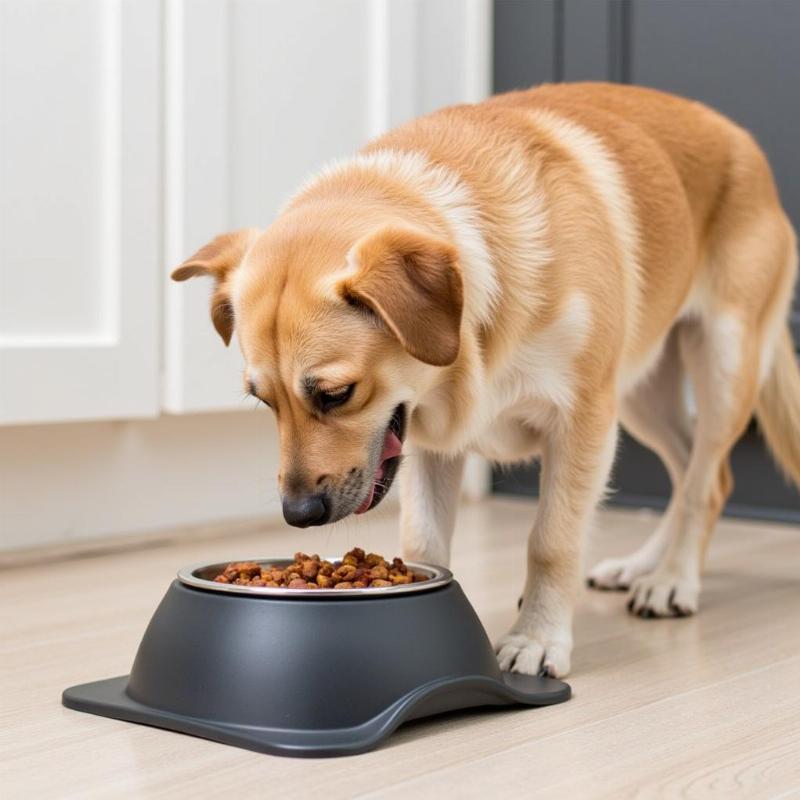Loss of appetite in an elderly dog can be a worrying sign for any pet parent. Is it just picky eating, or is something more serious going on? This comprehensive guide will explore the common reasons why your senior dog might be refusing food and offer practical solutions to help them regain their appetite and maintain a healthy weight.
Understanding Why Your Senior Dog Won’t Eat
Several factors can contribute to appetite loss in older dogs. These range from simple dental issues to more complex medical conditions. Identifying the underlying cause is crucial to addressing the problem effectively.
Dental Problems and Discomfort
As dogs age, dental disease becomes more common. Painful teeth and gums can make chewing difficult, leading to decreased food intake. Regular dental checkups and cleanings are essential for senior dogs.
Changes in Senses and Taste
Just like humans, dogs’ senses of smell and taste can diminish with age. This can make food less appealing and contribute to a decreased desire to eat. Offering highly palatable, flavorful food can sometimes help entice your senior dog to eat.
Underlying Medical Conditions
Various medical conditions, such as kidney disease, liver disease, cancer, and diabetes, can cause appetite loss in older dogs. If your senior dog’s loss of appetite is accompanied by other symptoms like lethargy, vomiting, or weight loss, consult your veterinarian immediately.
Cognitive Decline
Cognitive dysfunction syndrome (CDS), similar to dementia in humans, can affect senior dogs and impact their eating habits. Changes in routine, environment, and even food bowls can help dogs with CDS.
Medication Side Effects
Certain medications can have side effects that suppress appetite. If your dog recently started a new medication and subsequently stopped eating, discuss it with your veterinarian. They may be able to adjust the dosage or switch to a different medication.
Encouraging Your Elderly Dog to Eat
Once you’ve consulted with your veterinarian and ruled out any serious medical conditions, you can try several strategies to encourage your elderly dog to eat.
Offer Smaller, More Frequent Meals
Instead of two large meals, try offering several smaller meals throughout the day. This can be less overwhelming for a senior dog with a decreased appetite.
Try Different Foods
Experiment with different textures, flavors, and temperatures. Some senior dogs prefer wet food, while others may enjoy a little warm broth mixed with their kibble. You can also try offering homemade dog food, ensuring it’s nutritionally balanced for senior dogs.
Make Mealtime More Appealing
Use food puzzles or slow feeders to stimulate your dog’s interest in eating. Elevating the food bowl can also make it easier for some senior dogs to eat comfortably.
 Senior dog eating from an elevated bowl
Senior dog eating from an elevated bowl
Maintain a Consistent Routine
A regular feeding schedule can help regulate your dog’s appetite. Try to feed your dog at the same times each day, in a quiet and comfortable environment.
When to Seek Veterinary Help
If your elderly dog’s loss of appetite persists or is accompanied by other symptoms such as vomiting, diarrhea, lethargy, weight loss, or changes in behavior, consult your veterinarian immediately.
Conclusion
Loss of appetite in elderly dogs can be concerning, but with careful observation, veterinary guidance, and a few simple adjustments, you can often help your senior companion regain their enjoyment of food and maintain a healthy weight. Remember, providing a comfortable and loving environment is crucial for their overall well-being.
FAQ
- How long can an elderly dog go without eating? It’s crucial to consult your veterinarian if your senior dog hasn’t eaten for more than 24 hours, as this can lead to serious health complications.
- Is it normal for senior dogs to eat less? While a slight decrease in appetite can be normal with age, a significant or sudden change should be investigated.
- What are the best foods for senior dogs who won’t eat? Highly palatable wet food, homemade meals (under veterinary guidance), and food toppers can often entice picky eaters.
- Can dental problems cause loss of appetite in dogs? Yes, dental pain can make chewing difficult and lead to decreased food intake.
- Should I force-feed my elderly dog if they won’t eat? No, force-feeding can be stressful and dangerous. Consult your veterinarian for appropriate solutions.
- Are there any supplements that can help stimulate appetite in dogs? Your veterinarian can recommend safe and effective appetite stimulants if necessary.
- How can I make my elderly dog’s food more appealing? Try warming the food, adding a little low-sodium broth, or using food puzzles.
Beautdogs.us: Your Trusted Source for Dog Care
Beautdogs.us is your premier online destination for comprehensive and engaging information on dog care, breed specifics, and product recommendations. Whether you’re a seasoned dog owner or just starting your journey, Beautdogs.us offers expert advice, valuable resources, and a supportive community to help you provide the best possible care for your canine companion. We strive to be America’s trusted source for all things dog-related. Contact us today for all your dog care needs! Email: [email protected], Phone: +1 501-555-7529. Let Beautdogs.us help you navigate the joys and challenges of dog ownership!